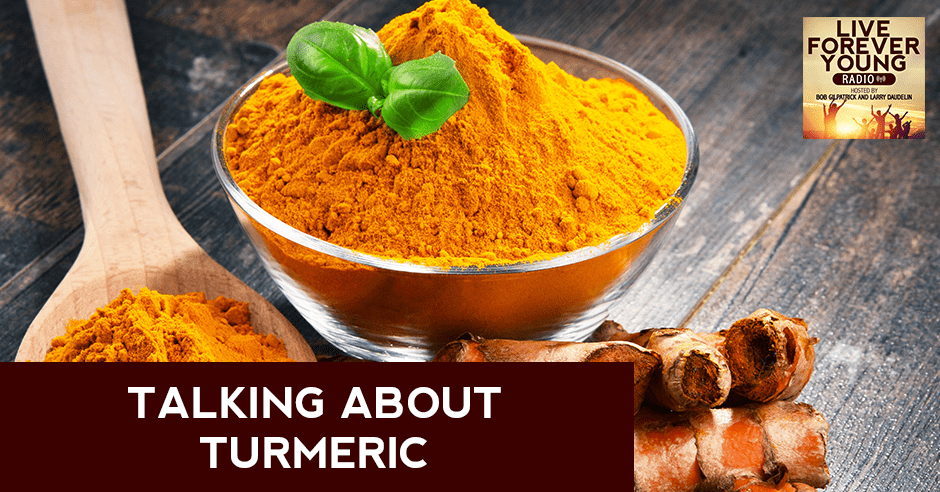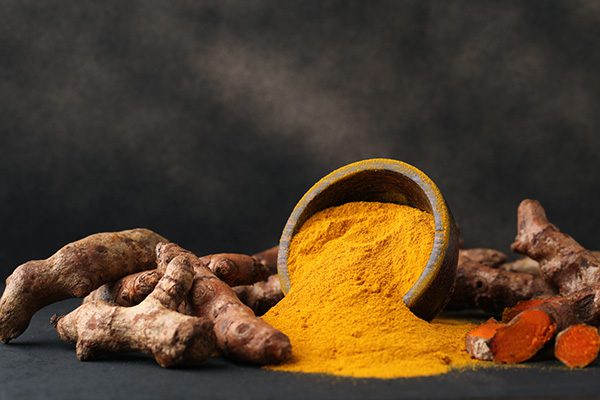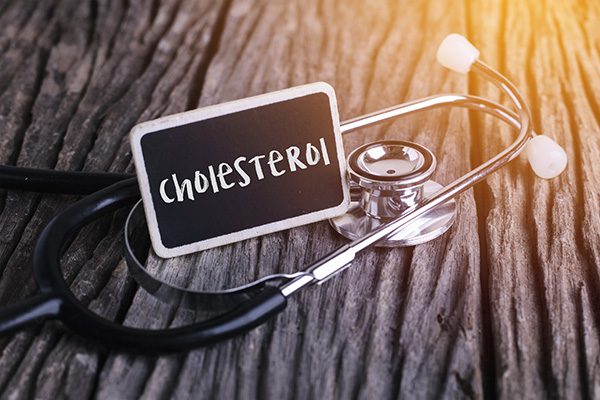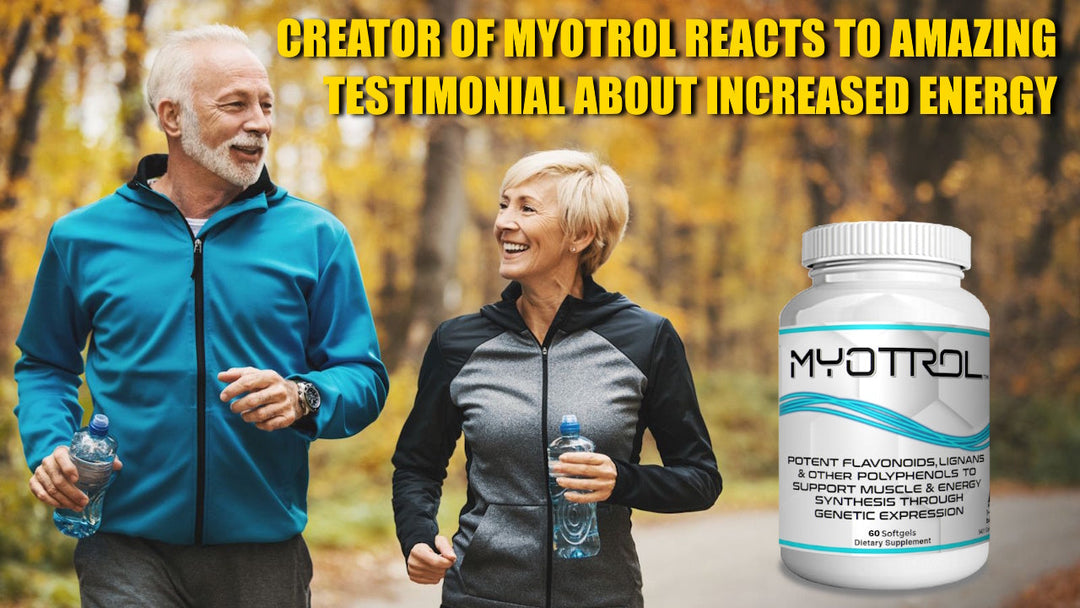Talking About Turmeric

Herbs offer a lot of untapped health benefits that we need to take a good look at. One such underutilized herb is turmeric, which produces the bioactive agent, curcumin.
In this episode, Bob Gilpatrick and Rollie Culp discuss herbalism and the health benefits of turmeric. We hear about how curcumin helps the body fight off inflammation, rheumatism, arthritis, and its neuroactive abilities as well.
Learn how new technology is unlocking the ability to absorb and utilize turmeric making it even more beneficial than previously thought. So sit back relax and get ready to live forever young.
Watch the podcast here:
Listen to the podcast here:
Talking About Turmeric
Ep. 4 In Our Exploring Herbalism Series
Most know turmeric as the tasty yellow spice used in curry, but it has also been used for over 5,000 years as a medicinal herb. In our fourth episode of our Exploring Herbalism series, we will be talking about turmeric and its counterpart curcumin and the multiple benefits they have to offer.
Bob and Rollie discuss turmeric's role in ancient Indian ayurvedic medicine and how you can even grow your own in your home garden. Learn how new technology is unlocking the ability to absorb and utilize turmeric, making it even more beneficial than previously thought. Sit back, relax and get ready to live forever young.
On our fourth episode of Exploring Herbalism, we're going to be talking about turmeric, an underutilized spice. A lot of people don't have an idea of the benefits that it can bring. First of all, I don't know if most people know this, but turmeric and curcumin come from the same thing, but they're two different things inside the world of herbalism.
We've talked in the previous shows about bioactive compounds. You can harvest a plant, in this case, turmeric, and there are bioactive compounds in the root of that plant. There's a class of bioactive compounds called curcuminoids. Curcumin is one of those curcuminoids. Most of the curcuminoid, about 75% that's in the turmeric group, is curcumin.
Curcumin is an herb because you can use it medicinally, but the turmeric root is typically used as a spice. There's a beautiful plant that's a leafy green plant and it gets these reddish orange-colored roots that are harvested, then they're dried out. You can grow turmeric yourself.
You were saying that it's pretty easy to grow it yourself at home. You can get turmeric root from your grocery store. If you know the right way to make the soil so that it drains but has enough water, you can then plant turmeric and grow your own. It'll grow up. The roots will spread out all in your soil and then you can harvest it. The hardest part is that you have to take the skin off of it and scrape it.
It’s like potato peeling. That's the definition of easy to grow. You could go to the grocery store, find a root that you're supposed to use for something else and throw it in the ground. As long as you got the soil right, you’re good.
Good soil and light. It likes to be sunny or mostly sunny. You can grow your own, dry it out in the sunlight, cut it up into little pieces after you take the peel off, cut it up into small pieces, put it out in the sunlight in a container. 4 or 5 days later, they'll be dried out, shriveled up, or you can do it in a dehydrator, and then you can grind it in a food processor. You can make a fine powder of it.
If you were big into making curry, that's what you would use to flavor the curry. It’s one of the main ingredients in curry dishes.
There's a lot of veggies and then it's the sauce. It's good. There's a place around here. Shout out to Nitally’s. They have some of the best curries you'll ever have down here in Florida.
Curry, it's tasty, orange. Everybody knows that turmeric is the main component of that. The curcumin is what we want to pull out. That's what you want to extract. It's a bioactive compound. It's been used for over 5,000 years in ayurvedic medicine.
India is on top of it when it comes to that. This is a plant that's in the ginger family. They knew centuries ago that it was good for fighting inflammation. We know from our previous show on inflammation how bad it can be. It causes about 95% of all diseases.
It's the root of a majority of the chronic diseases that people get when they get older because you don't make as many antioxidants. You age and you're not making as much antioxidants. A lot of times, you're not eating as well, so you're not getting a lot of good nutrition.
Your inflammation goes up as you get older. It's the root of the problem. The good news is we can address the root problem with a root. It couldn't be any easier. This is the kind of thing that we should be rooting for. As a result of this powerful anti-inflammatory effect, it is good for things like arthritis, both rheumatoid arthritis and osteoarthritis, which is wear and tear as opposed to rheumatoid arthritis, which is an autoimmune disease.
We know that curcumin is good at helping with the pain, swelling, and inflammation related to arthritis. I was talking about my old piano teacher and his gnarled fingers. That's the osteo type, from slamming them on the piano. He was 85 and his fingers were gnarled. That’s wear and tear. I should have known about turmeric back then. I could have helped him.

Turmeric Health Benefits: Curcumin offers a benefit that is neuroprotective and it also protects your vascular system.
It also helps to modify your cholesterol. It'll help to lower your LDL, particularly the small particle LDLs that are caustic. It will increase your good cholesterol, which is your HDL. There are studies that show this. That is a good way to reduce your risk of heart disease and stroke, which is one of the neurological conditions that curcumin can benefit from, which includes Alzheimer's disease and CTE, which is Chronic Traumatic Encephalopathy.
That is caused by damage to the head area and inflammation built up from it and never gone away. It also helps with Parkinson's disease and the prevention of strokes. Some studies show that curcumin offers a neuroprotective benefit for people at high risk for strokes and protects your vascular system. It's reducing your inflammation. It's very beneficial for this because there are less bioactive compounds.
We know that bioactive compounds can act to stimulate certain genes to express. Your DNA has genes that are wrapped up and encased in a sheath. When something pings it, it will open up an opening for the RNA to be able to copy it. We now know the exact genetic pathway and metabolic pathway that occurs when people take in curcumin. It stimulates a particular gene that helps with this protective effect against stroke.
You ran across over 1,000 new studies on curcumin itself and how many new things they're discovering if you can get it into the cell at a higher rate. How much more beneficial is it for your health? We talked about it in the other ones. Back in the day, with herbalism, you didn't have the ability to extract things and put them in perfect doses. These things work, but if they can't be absorbed naturally, how do you deliver them better?
A good part of the absorption is done in the small intestine. This is where it begins. When people take any type of compound, which the absorption of which is dictating the efficacy, you want to make sure that your intestines are well cleansed and that your villi are very healthy. We recommend people take a product like this with our sprouted barley seeds, which have the effect of cleansing your intestines and making sure that your villi, which absorb the nutrients, are in good condition.
At the same time, that same product not only cleanses your intestines but it helps with inflammation. Now you take the curcumin, which is going to get absorbed better when you take it with the sprouted barley, and you're getting a potentiating effect on the anti-inflammatory aspect.
When you were talking about arthritis and helping lower the inflammation that turmeric does, it's very beneficial at lowering your C-reactive protein, which we've talked about on other shows. That's the measure of inflammation in your body. If you can take in something that lowers that, it's going to slow down how fast you're burning up and you're aging. We talked about it in the other exploring herbalism episodes.
If you can stack these beneficial compounds on top of each other, you can multiply the effects of the antioxidant. It will help you get the antioxidants from the turmeric, you get the SOD from the barley, and then you get to increase your absorption because you're cleansing villi.
If you look it up, there's 4,000 square foot of villi in the 30 feet of the intestine that you have. It multiplies the surface area because of the villi multiplies to 4,000 square feet. That's a lot of square footage that could need cleaning.
The essence of health is human beings take in food by mouth. It gets digested, then the nutrients, bioactive compounds, carbohydrates, proteins and fatty acids get absorbed and utilized. The more you can tend to the absorption of nutrients, the healthier you're going to be. In this case, with curcumin, there's a clear differentiation between the effect of taking the pills or the powder and how much of it gets absorbed versus if it's not getting absorbed well. The efficacy drops dramatically and the studies show that.
The more you can get into a cell, the more it will help the body as a whole because the basis of life is the cell. Some of the things that we were looking at in those studies and the other things that I don't think a lot of people might realize is it helps with things like bone strength and colitis. Also, you wouldn't think about it, but it helps with your eyeballs. It helps with cataracts if you have cataracts.
It also helps your brain. If people are exposed to a lot of fluorides where there's too much in your water or some other source, it can have a negative effect on your endocrine system. The curcumin tends to neutralize the fluoride's negative effect, which can create calcification outside of your pineal gland. You want calcite crystals in your pineal gland.
That's what creates the electricity in your brain, but you don't want fluoride to create excessive calcification. The curcumin protects against that. It also is very helpful for people that have issues with PMS. Women before menopause are going to have a menstrual cycle. They might have cramping, irritability and mood swings. There are studies that show that curcumin tends to make those symptoms less.
Maybe it's helping regulate the hormones or something like that. It didn't say specifically in the studies I read, but it did show that there was a pronounced positive effect. One of the last things that I heard it helps with, which was odd and I was like, “Wow,” was asthma. Isn't asthma basically inflammation? It is to some extent. Asthma also tends to come along with other issues related to your lungs and there’s an underlying inflammatory effect. The anti-inflammatory effect helps with all these things.
It doesn’t cure asthma, but it makes the severity of it less. That could be a big help because sometimes people wake up in the middle of the night and they can't breathe. People can die from asthma attacks. It's good to know that curcumin is going to help with that. This was the fourth of our series.

Turmeric Health Benefits: Curcumin can help to lower your LDL, particularly the small particle LDLs that are very caustic and it will increase your good cholesterol, which is your HDL.
We'll have a couple more. That's probably it for now. Rollie, thanks.
Thank you, Bob. As usual, I love it. We're going to hope that any inflammation we run across, we can handle with our own turmeric grown from our garden.
Thank you for reading. We'll see you on the next show.





Leave a comment